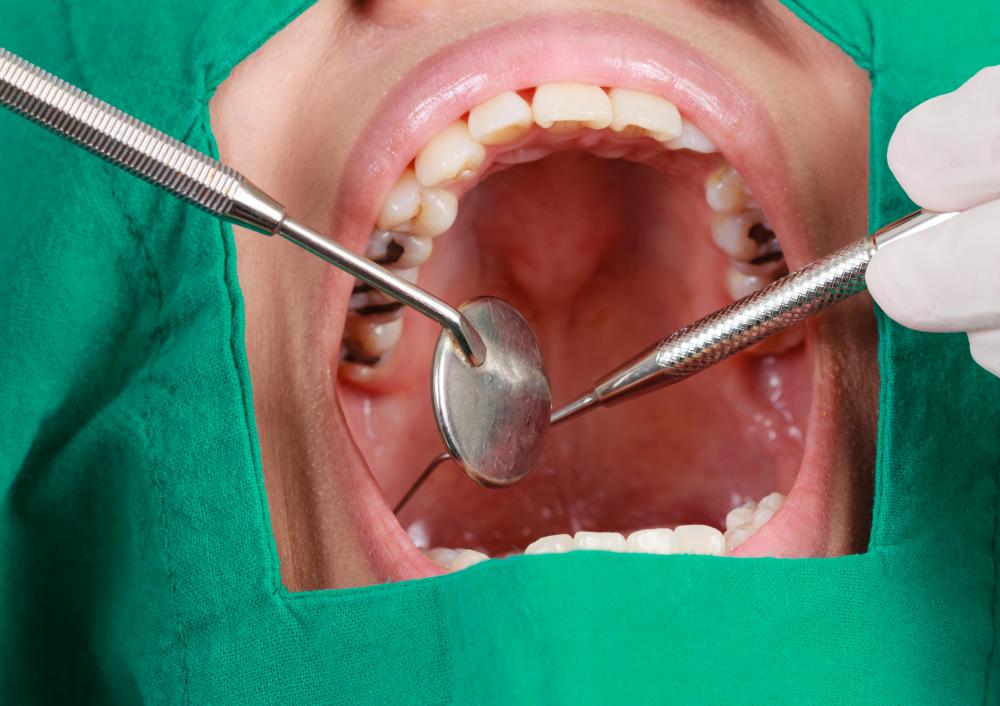At WiseGEEK, we're committed to delivering accurate, trustworthy information. Our expert-authored content is rigorously fact-checked and sourced from credible authorities. Discover how we uphold the highest standards in providing you with reliable knowledge.
What Is Full Mouth Disinfection?
Full mouth disinfection is the usual treatment for chronic periodontitis, or gum disease. This treatment involves assessing the damage already done to the teeth, followed by an intensive cleaning of the entire mouth, including the tooth sockets. The dentist also typically teaches the patient how to clean his or her teeth properly. The patient may also be provided with a disinfecting mouthwash. Completing a full mouth disinfection usually takes up to four dental appointments. The efficacy of this treatment also largely depends on the patient’s willingness to follow proper dental hygiene procedures.
Periodontitis usually features inflamed gums due to bacteria lodged in the tooth sockets. This condition also features heavy plaque on the teeth and a high tendency to get cavities. This kind of disinfection often helps alleviate symptoms from periodontitis by scraping all of the plaque out of the mouth and descaling the tooth sockets. This procedure does not cure gum disease but it can help the gums heal and keep the mouth healthy. To maintain the effects of the disinfection process, the dental patient must follow guidelines set down by his or her dentist.

The first dental appointment for full mouth disinfection usually involves measuring the teeth and examining the mouth to see how advanced the condition is. The dentist may then show the patient how to care for his or her mouth and suggest methods and items for keeping the mouth clean. This usually includes recommending a certain kind of toothbrush, mouthwash, floss, and rinsing techniques. No actual disinfecting is typically done during this first appointment.

During the second appointment for the disinfection, the dentist usually takes up to 90 minutes to clean and descale every part of the mouth, including the gum pockets. This procedure can be quite uncomfortable and can take a long time, so the patient is usually put under a local anesthetic. The dentist generally ends the cleaning session by rinsing the gums with cool water. After the patient wakes, he or she may be prescribed a special mouth rinse to be used several times a day.

A third appointment, very similar to the second, may or may not be needed, depending on how advanced the gum disease is. Subsequent appointments are typically scheduled about three weeks apart so the dentist can check on the cleanliness of the patient’s mouth. It is very important that the patient follow the dentist’s instructions to the letter while his or her gums heal. This procedure is effective only if the patient can follow up with excellent dental hygiene.
AS FEATURED ON:
AS FEATURED ON:
















Discussion Comments
@bear78-- I've heard about it too but I think it's better to break up the treatment to four weeks and visit once a week. The cleaning will probably be thorough. I don't know how long the one day treatment lasts but I don't have enough time in my schedule to sit in the dentist's office for half the day.
I think that the follow up visits also help the dentist determine whether the patient is following his directions and cleaning his or her teeth at home. If the full mouth disinfection is over with in one day, the patient may go back to his or her ways after the treatment and the dentist will never know.
Also, when I had a full mouth disinfection, I had teeth sensitivity as a result. Having that one week between treatments helped my teeth and gums heal and recover. I can't imagine what the pain and sensitivity will be like if it's all done in one day.
I've heard that it's also possible to get a full mouth disinfection in one sitting. Apparently some dentists offer this. Is a one time treatment as effective as the treatment that requires a visit for four weeks?
Some people say that they don't brush every day or don't floss. I'm shocked and alarmed when I hear this because I know that the result is going to be cavities and gum disease.
A full mouth disinfection is not a very pleasant experience but it's necessary to reverse and treat this condition. Those who don't want to have to go with it should brush and floss regularly. If oral hygiene rules are followed, gum disease should never be an issue.
@Vincenzo -- Brushing a couple of times a day is mandatory, too. And if you use smokeless tobacco or smoke cigarettes, that is just asking for gum disease at some point.
One problem people often have is that they just hate flossing and don't do it regularly. I had a dentist tell me that flossing every day is a great idea, but one can get by OK with an antiseptic mouthwash in a pinch. He said people should floss at least once a week and use that mouthwash often if they can't or are too lazy to floss daily.
Going through one of these procedures can be quite painful. The best thing to do is to prevent getting gum disease in the first place by flossing and using a mouthwash that effectively kills germs and bacteria rather than one that just makes your breath smell good.
Post your comments